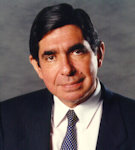
Óscar Arias Sánchez
George Santayana famously wrote that «those who cannot remember the past are condemned to repeat it.» At times, the reverse can also be true — if we are too quick to forget the rare victories of the human race, the transcendent moments of goodness or justice that we may be fortunate enough to witness once in a lifetime, then we are doomed to allow those lessons of the past to slip through our fingers, missing opportunities for a new generation.This month marks a milestone for an event with just such a lesson for us today: that peace is never out of reach, when human ego and pettiness can be set aside.
Aug. 7 was the 25th anniversary of a moment that changed my country and region forever — the signing of the Esquipulas II Peace Accords in Guatemala City. At the time we made our peace, the world’s superpowers were fighting a war in which they supplied the weapons, and Central America supplied the dead.
The United States and the Soviet Union saw their interests threatened by an independent agreement among Central American leaders, and the pressures upon us not to attempt our own solution cannot be overstated. We faced tremendous opposition from those who wanted military outcomes in our region, no matter the human cost.
However, the Central American peace process succeeded despite the odds, shocking Washington and the White House. It succeeded because of the courage of five presidents to tell the superpowers that we would find our own way out. It succeeded because of our willingness and determination to lock ourselves in a negotiation room until we reached an agreement.
Even after this accomplishment, the naysayers continued their work. The Peace Plan treated all signatory governments equally; cease-fire was one of the most urgent measures, but the real leitmotif of the Esquipulas Accords was that democracy is an indispensable requirement for lasting peace. I was called naïve by skeptics who claimed the countries of our region would never follow through on these commitments — particularly in Nicaragua, where I was told time and time again that a Marxist regime would never allow the elections that our accords required. They were proved wrong by the free and fair election of Violeta Chamorro as president in 1990.
The other countries of Central America also proved that they were capable of following through on the commitments we had made, even as the developed world turned their backs on us in terms of international aid just when we needed it most.
This story is worth remembering today. It was a historic achievement that allowed our region to wake up from a nightmare of violence, put an end to the domestic conflicts and civil wars that plagued us throughout the 1980s, and enter into a new era of peace. It was also an accomplishment that the global powers of the day never wanted to happen.
The conflicts in Central America were resolved entirely through negotiation among the parties directly affected and free from outside intervention. We succeeded in Central America because we decided to take our fate into our own hands and turned our backs on the powers that tried to impede us from sitting down at the negotiating table. Our people were the ones who were dying, and we alone had an obligation to end the bloodshed.
Today the people of Central America face a new generation of challenges. We find ourselves caught in the midst of the North-South drug war, which has brought unprecedented violence to our region. But we can reach back 25 years to find strength in our past success as pioneers for peace.
May our leaders remember that a peaceful solution is not an impossible goal if they have the courage to choose it. And may all of us find, in the memory of a rare success, a spark of hope.
Oscar Arias was twice elected president of Costa Rica. He won the Nobel Peace Prize in 1987 for his efforts to end conflicts in Central America.
Publicado en el periódico «The Miami Herald», 8 agosto de 2012.